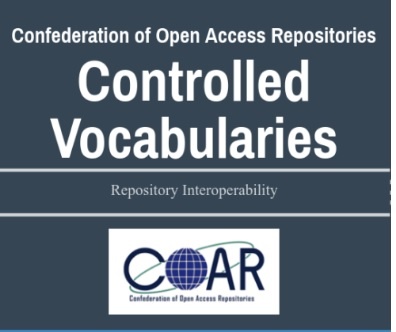Use COAR Controlled Vocabularies to enhance the Interoperability across repositories and with other related systems
30/01/2018


Image source: COAR Controlled Vocabularies INFOGRAPHIC
Did you know that COAR Vocabularies on Access Rights and Resource Types are already referenced in the updated OpenAIRE Guidelines for CRIS Managers and OpenAIRE Guidelines (v.4) for Literature Repository Managers?
Moreover, COAR Controlled Vocabularies INFOGRAPHIC (EN) is now also available in Spanish (ES) and French (FR) languages.
Learn more about COAR Controlled Vocabularies and make sure You get everything ready to make the best possible use of them.
___________________________________________________________________________________________________
COAR Controlled Vocabularies: What & Why & How?
As currently the usage of consistent controlled terms is still not widespread across repositories, and these latter often use local terms and/or tend to apply too broad concepts that do not qualify the resource properly, standard and widely-shared controlled vocabularies may bring many benefits for harvesters.
To fill this gap, the COAR Controlled Vocabularies Editorial Board has:
- analyzed existing vocabularies and dictionaries – used in the frame of open access repositories, scientific publishing platforms and research data management projects;
- chosen the most appropriate and widely shared concepts and terms (labels),
- defined, accordingly, the following five COAR controlled vocabularies:
|
1. |
Access Mode/Rights to declare the degree of ‘openness’ of a resource |
|
2. |
Resource Type to identify the genre of a research resource |
|
3. |
Resource Version to express a specific version of a resource |
|
4. |
Date Type to tag an event in the life cycle of a resource |
|
5. |
Classification Scheme |
These vocabularies are going to be continuously revised, updated and maintained by international community of practice.
At the technical level, the COAR Controlled Vocabularies are edited in VocBench and described in SKOS, where concepts are identified using URIs. Besides, labels to the concepts can be offered in multiple languages, notes are allowed for description, as well as different annotations and concepts from other vocabularies can be linked.
|
COAR Controlled Vocabularies Interest Group (IG) aims to improve existing vocabularies, develop new ones in the need of the repository community, broaden the language diversity and ensure wide adoption of the vocabularies. |
|
If you are interested in joining the COAR Controlled Vocabularies Interest Group, please send a message to the [email protected] or to IG chair Jochen Schirrwagen. |
The adoption of COAR Controlled Vocabularies…
… by the most commonly used free and open –source repository software is a way to enhance the interoperability across repositories (and their content), and with other related systems such as harvesters, CRIS (Current Research Information Systems), data repositories and publishers.
Last but not least. If you like to contribute to the translation of COAR Controlled Vocabularies INFOGRAPHIC, please request access to edit this text file.
Read more on COAR Controlled Vocabularies and feel free to spread the word !
___________________________________________________________________________________________________
Related:
- COAR Controlled Vocabularies presented at the Open Science FAIR 2017 International Conference
- All the presentations from COAR 2018 annual meeting
- Highlights from Controlled Vocabularies Workshop in COAR2017 Annual Meeting
- Technical Recommendations of the COAR Next Generation Repositories Working Group
- The Open Research Glossary (Software Carpentry)
- Open Research Glossary (on FigShare, by Jon Tennant Ross Mounce)
- CASRAI Standard Glossaries with five separate review tracks (Research Data Management (IRIDIUM) Standard Glossary; Open Access Standard Glossary; Academic Research Career Levels Standard Taxonomy; Impacts Data Collection Standard Template; Common Glossary of Cross-Cutting Terms)
- CASRAI Glossary on Research Data Domain (Each term has a unique identifier UUI and a URL that can be used as references to enhance reading comprehension of documents by hyperlinking terms to their definition)
- Registry of Open Access repositories
